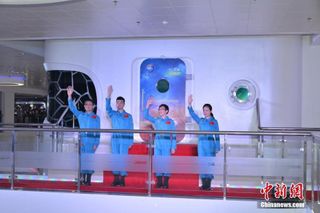
Chinese Volunteers Complete 180-day Space Simulation

Chinese researchers have completed a 180-day "survival experiment" that simulated a deep space human trek.
Since June 17, four Chinese volunteers — three men and one woman — lived inside a sealed space capsule situated in Shenzhen, south China's Guangdong Province. They emerged from their off-world mock-up mission on December 14, local time.
The six-month experiment involved volunteers Tang Yongkang, Luo Jie, Wu Shiyun and Tong Feizhou.
An objective of the space simulation was to test technologies that could support China's deep-space exploration projects. The effort is evaluating how food, water, and oxygen can be used and recycled under controlled conditions.
More than a dozen Chinese and overseas institutions are involved in the experiment, including the Astronaut Center of China, Harvard University and the German Aerospace Center.
Sealed capsule
The 1,340-cubic-meter sealed capsule has a floor space of 370 square meters, and is divided into eight compartments, including passenger compartments, resource compartments and greenhouse compartments.
According to CCTV-Plus, the volunteers cultivated about 25 different kinds of plants in the capsule, including wheat, potatoes, sweet potatoes, soybeans, peanuts, lettuce, edible amaranth and Chinese cabbage. The plants are part of a large ecological treatment system that helps recycle and regenerate oxygen and water that will reduce the dependency on outside supplies.
Get the Space.com Newsletter
Breaking space news, the latest updates on rocket launches, skywatching events and more!
Researchers engaged in the simulation have been monitoring and observing how a hermetic environment affects physiological changes, biological rhythms, sleep patterns and emotional well-being.
Tai Chi
In a CCTV-interview, volunteer Tang said that as time sped by, the psychological pressure of being in the confined capsule gradually built up.
"I think (the pressure has risen) during the middle and later stages of the experiment, around three quarters of the way through. But maybe everyone differs. During this period, the pressure on emotions and other areas might be comparatively higher," said Tang prior to departing the facility.
To deal with stress, Chinese researchers developed a series of Tai Chi moves specifically for use by the volunteers.
"According to those of us inside the capsule, it did help in soothing our emotions. But further detailed statistical analysis is needed before we reach a specific conclusion," said volunteer Tong.
New homes off-planet
Li Yinghui, head of the 180-day survival experiment in the sealed module, explained to CCTV-Plus:
"To develop new homes [on other planets], the first problem to be solved is how to survive there, including an environment for living, air for breathing, food, and then health security. So design of this experiment was aimed at such exploration targets."
For a video look at the sealed space capsule and the volunteers, go to:
http://cd-pv.news.cctvplus.com/2016/1214/8038612_Preview_8010.mp4
http://pv.news.cctvplus.com/2016/1212/8038424_Preview_1481546069993.mp4
http://l3-pv.news.cctvplus.com/2016/0615/8024222_Preview_1465991623125.mp4
Leonard David is author of "Mars: Our Future on the Red Planet." The book is a companion to the National Geographic Channel six-part series airing in November. A longtime writer for Space.com, David has been reporting on the space industry for more than five decades. Follow us @Spacedotcom, Facebook or Google+. Story published on Space.com.
Join our Space Forums to keep talking space on the latest missions, night sky and more! And if you have a news tip, correction or comment, let us know at: community@space.com.

Leonard David is an award-winning space journalist who has been reporting on space activities for more than 50 years. Currently writing as Space.com's Space Insider Columnist among his other projects, Leonard has authored numerous books on space exploration, Mars missions and more, with his latest being "Moon Rush: The New Space Race" published in 2019 by National Geographic. He also wrote "Mars: Our Future on the Red Planet" released in 2016 by National Geographic. Leonard has served as a correspondent for SpaceNews, Scientific American and Aerospace America for the AIAA. He was received many awards, including the first Ordway Award for Sustained Excellence in Spaceflight History in 2015 at the AAS Wernher von Braun Memorial Symposium. You can find out Leonard's latest project at his website and on Twitter.
